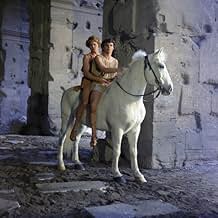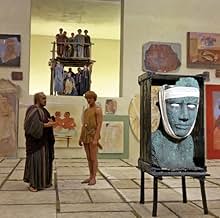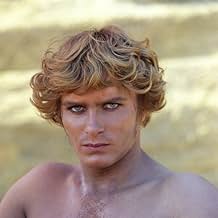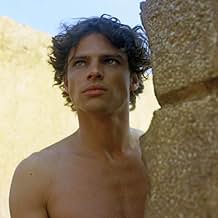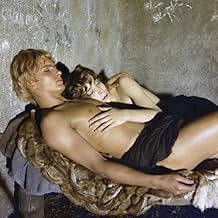A series of disjointed mythical tales set in first-century Rome.A series of disjointed mythical tales set in first-century Rome.A series of disjointed mythical tales set in first-century Rome.
- Nominated for 1 Oscar
- 5 wins & 8 nominations total
- Trimalcione
- (as Il Moro)
- Scintilla
- (as Danica la Loggia)
- La matrona
- (as Lucia Bosé)
- Il suicida
- (as Joseph Weelher)
- Minotauro
- (as Luigi Montefiori)
Featured reviews
As Vincent Canby said in his review, from 1970 in the New York Times, 'Fellini Satyricon is its own justification'. This movie exists purely to engage on an aesthetic level. The surrealism, the carnival-of-life atmosphere, the monumental pageantry, the visual juxtaposition of beauty and ugliness, and the black humour are all the film possesses and are all it requires. I believe that Fellini's intention with this film was simply to entertain. And he was a master entertainer, no doubt.
Don't expect much in the way of characterisation, of complex plot developments, or of nifty moral expression. This is a film that looks and sounds beautiful, and it manages to hold your interest (or mine anyway, I can't speak for everyone) for two brief hours by doing just that. Fellini = Godlike genius.
Fellini's movie was only loosely inspired by its literary source, Petronius's Satyricon. The nominal "plot" follows two young Roman men, the blonde Encolpio and the brunette Ascilto, introduced as rivals in love for the coquettish, androgynous slave-boy Gitone. When the latter chooses to be with Ascilto, the spurned lover Encolpio becomes involved in a series of adventures, all narrated with a familiar (to Fellini lovers), non-linear narrative structure with temporal inconsistencies and dreamlike, sudden changes of setting and mood. Encolpio attends the decadent banquet of a former slave, Trimalcione, now filthy rich. Eumolpo, an impoverished poet whom Encolpio meets on the way there, despises the wealthy man, all the more so for being rich and for having the nerve to also call himself a poet. The faint-hearted may at this point find much to object to the lasciviousness with which the banquet guests eat, drink and act lustful with one another is anything but subtle. The Trimalcione sequences felt to me like a satirical commentary on the rise of the nouveau riche in 1960s Italy. A highlight of the banquet scene is the story that the host narrates. It tells of a young widow, an oasis of cinematic calm in among the strident cacophony of the rest of the movie.
In a narrative passage which is reminiscent of the rhythm of dreams (typical of late Fellini, betraying his Jungian tendencies), Encolpio ends up captured by the pirate Lica, who takes him on board his ship. This is where the young buck meets Ascilto and Gitone again, also captives of the tyrant. At this point I was especially impressed with the extraordinary talent of Donati as a set designer. The ship wasn't built to look like a recognisable ship at all, but was rather like a symbol of one. Needless to say that no matter how abstract it was, you knew it was a ship, as its "ship-like essence" was all there! When Encolpio is beaten in a duel with Lica, he is forced to marry the pirate in a ceremony celebrated on the deck. But Lica is decapitated by some political rivals when a new Emperor takes over. "Everything changes so that it can all stay the same" is a cynical saying you still often hear in Italy. It refers to the fact that one greedy ruler will succeed another in a ruthless battle for power and privilege. That's when you realise Satyricon is a brilliant satire of modern society as well.
Encolpio and Ascilto then wander into the aristocratic home of a husband and wife who've just freed their slaves and committed suicide through bleeding themselves to death (a symbol of the death of aristocracy while the nouveau riche are getting fat?). After a threesome with a slave-girl who was left behind in the dead couple's empty home, the two young men attend a sort of sanctuary where an old man exploits the alleged healing powers of a very sick-looking, ethereal hermaphrodite child. Worshippers, lepers, cripples and sick people of all descriptions flock to ask for favours off the allegedly divine hermaphrodite. If this isn't a dark, ruthless parody of the Catholic practice of worshipping saints' relics, I don't know what is!
Subsequently captured by some soldiers, Encolpio is defeated by the Minotaur in his mythological labyrinth. The young man's life is spared when he literally talks the Minotaur out of slaying him, in a scene which is both post-modern and subtly comical. But a new humiliation is in store for Encolpio, which has him set off looking for the sorceress Enotea. Her story is told in flashback. Yet again, the prudish and faint of heart will not find the scenes of a cursed woman literally "giving birth" to fire through her vagina as their cup of tea! Though admittedly unsavoury, I also find such elements to be archetypically symbolic, and ultimately fascinating.
After visiting Enotea, Encolpio witnesses the killing of his friend Ascilto. Desperately upset, Encolpio decides to set sail for Africa on a merchant ship owned by the once-poor and bitter old poet Eumolpo, now as filthy rich and decadent as Trimalcione, whom he had once criticised for his parvenu vulgarity. When the old poet dies, he leaves a testament stating that whoever will eat his corpse will have a share of his wealth - basically, inheritance by cannibalism! Encolpio refuses the deal, while a group of greedy Roman dignitaries are shown chewing on what must obviously be the dead poet's tough old flesh, looking like so many fat cows chewing on their cuds. If a satire of a stagnant and greedy society was ever more potent and cutting than this, I would really like to hear about it!
Fellini himself defined this movie as being "Science fiction of the past". The movie's complete and intentional artifice, its occasionally obscure symbolism and gallery of grotesque portraits and strident soundtrack may not be everyone's thing. What is especially unsettling about Satyricon is that the viewer is led into a realm in which you have no idea what boundaries might be crossed. That's exactly why this is a perfect portrayal of an epoch of complete moral decadence - it drags the viewer into the exact same realm of uncertainty that the characters experience.
Did you know
- TriviaGian Luigi Polidoro registered the title Les dégénérés (1969) for his movie first. Federico Fellini fought to use the title for his movie but lost the case. Subsequently the title was changed to Fellini Satyricon.
- GoofsIn one version, Joseph Wheeler is credited as 'Joseph Weelher'.
- Quotes
Soldier at Tomb: They've stolen the hanged man! While I was with you, the thief's family took him away! I know what punishment I'll get... a horrible death. Why should I wait for it? I'd rather die by my own hands.
[pulls his sword out and is about to stab himself]
Wife of Ephesus: [stops him] No! No, my dear... To lose the two men in my life, one after the other, would be too much...
Wife of Ephesus: [looks at the corpse of her husband] Better to hang a dead husband than to lose a living lover.
[the couple replace the missing hanged corpse with the corpse of her husband]
- ConnectionsEdited into Fellini: Je suis un grand menteur (2002)
- SoundtracksThe Drums for the Niegpadouda Dance
From Anthology of Music of Black Africa
Recorded by Everest Records
Arranged by Bernard C. Salomon
Published by Arvon Music
- How long is Fellini's Satyricon?Powered by Alexa
Details
Box office
- Budget
- $3,000,000 (estimated)
- Gross US & Canada
- $1,135,943
- Gross worldwide
- $1,138,108
- Runtime2 hours 9 minutes
- Sound mix
- Aspect ratio
- 2.35 : 1






